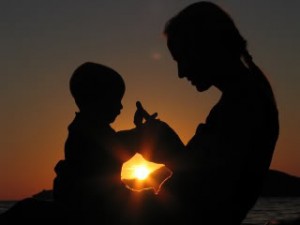An excerpt from the Mindfulness workshop given by Jetsunma Ahkon Lhamo in 1999
As human beings, some of the greatest downfalls and difficulties are the constant messages and self-imposed kinds of structures or ideas regarding how we should be and shouldn’t be. When we fail to come up to these standards and these ideals, the guilt that we have is so profound that it stops us dead in our tracks and we feel worthless and a whole, neurotic scenario begins about worthlessness. It is absolutely the opposite from the kind of practice that we want to do. We may think that as spiritual people we should feel like nothing, be humble. Try to understand it a little differently.
If you’re walking around superimposing an idea on yourself and you’re feeling worthless and guilty and like nothing, that’s not really spiritual. One is supposed to be in a state of Recognition, not in a state of neurosis. So this guilt, which results from having all these ideas of how we ‘should be’ in this materialistic society, and the feeling that we are criminal if we don’t measure up to these ideas, is very much all-pervasive. Witness how it is as a mother; when you have small children. You know what it’s like when you develop that cord between yourself and your child where they become little satellites. They’re out there, but there’s this little cord, this connection, between the mother and the child so that if the child is no longer in your sight, as a mother, you react to that. That pulls the cord. There is a big feeling of, “Oh, I have got to take care of my child, and I have to make sure my child is safe. I have to supervise my child.” If for one moment we respond differently to it or perhaps not quickly enough, or if there’s a moment of confusion, we immediately think of ourselves as criminals, and we immediately think the first thing to do is hide that. Then we carry around this block of guilt and criminal feelings that make us act out in certain ways that are unfortunate.
Training the mind to constantly be in a state of offering, to constantly be in a state of more and more increasing Recognition is a way to circumvent the criminalizing-guilt neuroses. To be able to gain a deeper recognition of the nature of phenomena, of what is sacred and what is ordinary, what is meaningful and should be gathered and what should be abandoned; to gain a better recognition of the faults of cyclic existence, and be able to distinguish between a diamond and a piece of glass — to train oneself in that way moves us out of that realm of being ego in the center of our own mandala, constantly being good or bad, blaming, judging, being hopeful or fearful — that constant neurotic scenario that ultimately, when you really look at it, is what we call ‘us.’ In training the mind to a deeper Recognition as an extension to one’s practice, and to practice constantly as we move around, is an antidote that is extremely powerful.
In terms of thinking about how our minds work, did you ever try to just sit down and just still the mind, just kind of relax and go blank? Did you ever try to do that? To try to get your mind to do that is like screaming at a monkey in a cage to stop jumping up and down. What do you think is going to happen? The monkey is going to go even crazier. So in practicing in the way that I’ve described, constantly offering and not clinging, (therefore applying the antidote to clinging), constantly moving deeper and deeper into a state of better Recognition rather than deeper and deeper into ego-clinging, self-cherishing and neurosis, what happens is that it actually calms the mind. It’s like it begins to apply the remedy or the medicine that makes our mind change from something that is inflamed to something that is much more relaxed so that our minds actually begin to change. That happens in our sit-down practice, and that also happens in our mindfulness as we walk around.
© Jetsunma Ahkön Lhamo












Thank you for this Precious Teaching Jetsunma, thank you thank you!